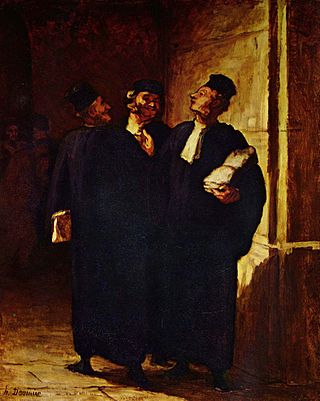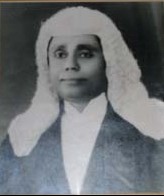Related Research Articles

A barrister is a type of lawyer in common law jurisdictions. Barristers mostly specialise in courtroom advocacy and litigation. Their tasks include arguing cases in courts and tribunals, drafting legal pleadings, researching the law and giving legal opinions.

An "advocate" is a professional in the field of law. Different countries and legal systems use the term with somewhat differing meanings. The broad equivalent in many English law–based jurisdictions could be a barrister or a solicitor. However, in Scottish, Manx, South African, Italian, French, Spanish, Portuguese, Scandinavian, Polish, Israeli, South Asian and South American jurisdictions, "advocate" indicates a lawyer of superior classification.

In the United Kingdom and some Commonwealth realms, a King's Counsel is a senior lawyer appointed by the monarch of the country as a "Counsel learned in the law". When the reigning monarch is a woman, the title is called Queen's Counsel (QC).
A bar association is a professional association of lawyers as generally organized in countries following the Anglo-American types of jurisprudence. The word bar is derived from the old English/European custom of using a physical railing to separate the area in which court business is done from the viewing area for the general public.
The call to the bar is a legal term of art in most common law jurisdictions where persons must be qualified to be allowed to argue in court on behalf of another party and are then said to have been "called to the bar" or to have received "call to the bar". "The bar" is now used as a collective noun for barristers, but literally referred to the wooden barrier in old courtrooms, which separated the often crowded public area at the rear from the space near the judges reserved for those having business with the court. Barristers would sit or stand immediately behind it, facing the judge, and could use it as a table for their briefs.

Court dress comprises the style of clothes and other attire prescribed for members of courts of law. Depending on the country and jurisdiction's traditions, members of the court may wear formal robes, gowns, collars, or wigs. Within a certain country and court setting, there may be many times when the full formal dress is not used. Examples in the UK include many courts and tribunals including the Supreme Court of the United Kingdom, and sometimes trials involving children.
Proctor is a person who takes charge of, or acts for, another.
An admission to practice law is acquired when a lawyer receives a license to practice law. In jurisdictions with two types of lawyer, as with barristers and solicitors, barristers must gain admission to the bar whereas for solicitors there are distinct practising certificates.

A. W. H. Abeyesundere, QC was a Sri Lankan lawyer, independence activist, former acting Attorney General of Sri Lanka and judge of the Supreme Court of Sri Lanka.

Sri Lanka Law College, formerly known as Ceylon Law College, is a law college, and the only legal institution where one can enroll as an Attorney-at-Law in Sri Lanka. It was established in 1874, under the then Council of Legal Education, in order to impart a formal legal education to those who wished to become Advocates and proctors in Ceylon. The main building of the college was constructed in 1911. It is located on Hulftsdorp Street in Colombo, Sri Lanka. As of late 2021, the current principal is Dr. Athula Pathinayake.
Attorney at law or attorney-at-law, usually abbreviated in everyday speech to attorney, is the preferred term for a practising lawyer in certain jurisdictions, including South Africa, Sri Lanka, the Philippines, and the United States. In Canada, it is used only in Quebec as the English term for avocat. The term has its roots in the verb to attorn, meaning to transfer one's rights and obligations to another.
Maas Thajoon Akbar, KC was a Ceylonese, judge and lawyer. He was a judge of the Supreme Court of Ceylon and Solicitor General of Ceylon.
Thusew Samuel Fernando, CBE, QC was a Sri Lankan lawyer and judge. He was a Puisne Justice of the Supreme Court of Ceylon and Solicitor General of Ceylon.
Sir Lalitha Abhaya Rajapaksa, QC was a Ceylonese lawyer and politician. He was the first Minister of Justice of Ceylon and a member of the Senate of Ceylon.
Sir Thomas Forrest Garvin II, KC was a Ceylonese judge and lawyer. He was a judge of the Supreme Court of Ceylon and Solicitor General of Ceylon.
Victor Tennekoon QC was a Sri Lankan lawyer and jurist. He served as the 35th Chief Justice of Sri Lanka, as well as the 33rd Attorney General and 23rd Solicitor General. From 1979 to 1984 Tennekoon served as Chancellor of the University of Peradeniya.
Hugh Norman Gregory Fernando, OBE was Sri Lanka lawyer and judge. He was the 33rd Chief Justice of Ceylon and had served as Legal Draftsman of Ceylon.
Manikku Wadumestri Hendrick de Silva, QC was a Ceylonese lawyer, judge and statesman. He served in several top legal positions in the island, as the 26th Attorney General of Ceylon, a Puisne Justice of the Supreme Court of Ceylon and finally the Minister of Justice in the cabinet of S. W. R. D. Bandaranaike as a member of the Senate of Ceylon.
Kanaganayagam Kanag-Isvaran is a leading Sri Lankan Tamil lawyer and President's Counsel.
Legal education in Sri Lanka is based on the constitution and the legal framework of Sri Lanka which is mainly based on Roman-Dutch law.
References
- ↑ "Administration of Justice Law (No. 44 of 1973)". commonlii.org. Sri Lanka Consolidated Acts. Retrieved 14 February 2022.
- 1 2 3 Wright, Arnold (1999). Twentieth Century Impressions of Ceylon. ISBN 9788120613355.
- ↑ "Administration of Justice Law (No. 44 of 1973) - Sect 36". Sri Lanka Consolidated Acts. Retrieved 3 May 2024.
- ↑ "Appointment of President's Counsel".
- ↑ SRI LANKA LAW COLLEGE Archived August 29, 2010, at the Wayback Machine
- ↑ "This, That and the Other" About the Legal Profession and the Judiciary
- ↑ De Silva, Kamalini (November 2015). "Professional Ethics for Lawyers" (PDF). Proceedings of 8th International Research Conference, KDU, Published. Retrieved 27 April 2020.